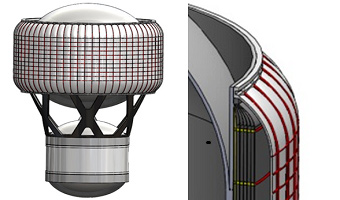TUCSON, AZ (March 21, 2016) – Paragon Space Development Corporation® (Paragon) and partner Thin Red Line Aerospace (TRLA) received a Phase II Small Business Innovation Research (SBIR) award from NASA to advance their Cryogenic Encapsulating Launch Shroud and Insulated Upper Stage (CELSIUS) technology. The Phase II effort will design and test a novel, high performance, inflatable system to address the agency’s near-term needs as well as provide a resource for future exploration missions to the moon, mars, and deep space.
 CELSIUS provides thermal insulation and protection from micro-meteoroids and orbital debris. The system also comprises launch vehicle fairing functionality, protecting the spacecraft from dynamic pressure loads and aero-heating throughout launch and ascent. These capabilities are accomplished by applying a deterministic soft-goods system that provides far greater performance for far less mass and cost than the equivalent state of the art systems performing the same functions.
CELSIUS provides thermal insulation and protection from micro-meteoroids and orbital debris. The system also comprises launch vehicle fairing functionality, protecting the spacecraft from dynamic pressure loads and aero-heating throughout launch and ascent. These capabilities are accomplished by applying a deterministic soft-goods system that provides far greater performance for far less mass and cost than the equivalent state of the art systems performing the same functions.
“Paragon’s history with the SBIR program has proven time and again that we are developing products and solutions that solve some of the industry’s toughest challenges. The fact that we were able to team with a company like TRLA for this proposal further substantiates that, and ensures that this technology will mature quickly and efficiently while providing an immediate value to our customer,” said Grant Anderson, Paragon President and CEO.
“CELSIUS represents yet another step forward in validation of the advantages of sophisticated inflatable architecture through application of exceptional advances in soft goods technology,” added TRLA President Maxim de Jong.
Paragon and TRLA are actively engaged with industry partners to provide this solution for a range of applications including on-orbit upper-stage refueling and depot concepts.
